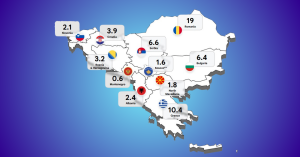In April 2021, the European Commission launched a package of measures to channel money toward sustainable activities, marking another step on the EU agenda to reach climate neutrality by 2050. For companies and investors, this is one of the most important developments in sustainable finance to date. It offers critical frameworks for enabling ESG (Environmental, Social, and Governance) reporting and green finance.
First, the package proposes a Corporate Sustainability Reporting Directive to improve the flow of sustainability information in the business world. What does this mean for companies? More and clearer guidelines around reporting on ESG criteria to facilitate the process, more transparency, and an increase of their chances to access green finance. ESG criteria are standards evaluating the company’s performance in terms of non-financial impact, which investors can use to screen potential investments.
Environmental, social, and governance (ESG) criteria are a set of standards for a company’s operations that socially conscious investors use to screen potential investments.
It also includes an EU Taxonomy Delegated Act, a tool whereby stakeholders can identify the economic activities and technologies that most contribute to meeting the EU’s sustainability goals. The EU Green Taxonomy aims to bring clarity to both investors looking to finance green projects and companies attempting to evaluate and improve their impact.
In a recent event, experts at Deloitte, Raiffeisen Bank Romania, and BRD – Groupe Société Générale, among others, shared some insights on the evolution of ESG and green finance in Romania, considering new regulations from the EU and European institutions. The event was coordinated by Ziarul Financiar and Deloitte Romania.
What ESG means for the Romanian market
ESG can be a way to make sustainability specific and measurable, Cristian Sporis, Vice President at Raiffeisen Bank Romania, said. This is needed by companies and banks alike.
The principles behind ESG are not completely new to the Romanian market. Raiffeisen has been issuing green loans since 2012 and was the first to issue green bonds in Romania in 2021.
Sorin Elisei, Director at Deloitte Romania, explained that ESG is also about transforming the quality of life in the future by keeping climate change under control. Given its high stakes, ESG requires a collection of regulations and impositions, however, it also involves a volunteering attitude.
So far, Romania has not performed well in the space of sustainable development. In the Sustainable Development Report 2021 by Jeffrey Sachs and the team, Romania is in 39th place out of 165 with a score of 75. This is an overall decent position, but compared to other EU countries, Romania is a laggard.
As the panelists emphasized several times, we first need data, to overcome the perception that we cannot be frontrunners, gain a sense of evolution, and identify critical challenges yet to be addressed.
One key ally to gain this visibility will be the government. Monitoring and reporting by companies can be done only in collaboration with the institutions that coordinate and regulate the space. László Borbély, State Counselor and Coordinator of The Department for Sustainable Development at the Government of Romania brought forward the importance of having historic impact data and an institutional monitoring system behind ESG.
The State Counselor also said that Romania is preparing a code of sustainability to guide companies on ESG requirements. Among others, this may involve questionnaires for companies prepared by a scientific council and a dashboard on the 17 objectives which will serve as benchmarks.
For its projects, the Government has also partnered with the Sustainable Romania Coalition, a group of around 50 entities, coordinated by the Embassy of Sustainability in Romania. The group is open to participation from citizens and professionals, allowing the community to have a say on the action plan and receive feedback from the state.
How companies can work on becoming ESG-ready

As Alexandru Reff, Country Managing Partner at Deloitte highlighted during the event, ESG will influence how investments are made. Companies with better performance along ESG criteria will benefit from lower financing costs, which will increase their competitiveness. Even when considering funding opportunities that will follow such as the Just Transition Fund and the National Recovery and Resilience Plan, which dedicates 37% of its budget to sustainability, companies will still need to make substantial investments. It is important for Romania to identify how to address regulatory requirements to its economic reality.
The calendar of green regulation has sped up since 2014, Irena Pichola, Partner at Deloitte Polonia added. In the last two years, many new definitions and regulations were introduced. In response, financiers have new priorities around sustainability.
For companies, the implementation of certain requirements such as transparency along the supply chain will not be an easy task. To support this transition, companies will need dedicated professionals, such as Sustainability Officers. That is why see more and more professionalization of the functions that orchestrate sustainability within companies, says Irena Pichola. Such roles will bring new competencies in the space and add sustainability to strategic business planning and execution.
Requirements are not always straightforward, which is why a better education on the topic and dedicated teams are often necessary, especially for larger companies. Local financial institutions such as EBRD, for instance, require the submission of in-depth ESG questionnaires where the level of detail is very high.
Sorin Elisei further shared a stepped approach to preparing companies around reaching a high ESG readiness score: measuring, analyzing, implementing, and transforming the company. The first two steps are critical – they measure the corporate performance based on indicators, established by regulators and certified agencies. At this point, companies also identify critical impact areas and determine the gaps between their performance and targets.
Finally, Yves Lallemand, Deputy CEO at BRD – Groupe Société Générale mentioned some ESG and green financing incentives in the market. The European Banking Authority, for instance, has established a set of criteria to encourage banks to green finance the economy. A capital relief initiative is under discussion, whereby loans can be granted at better pricing for high ESG performing companies. Mr. Lallemand added that The National Committee for Macroprudential Supervision (CNSM) also provides a set of measures to encourage the development of green finance that companies can use.








